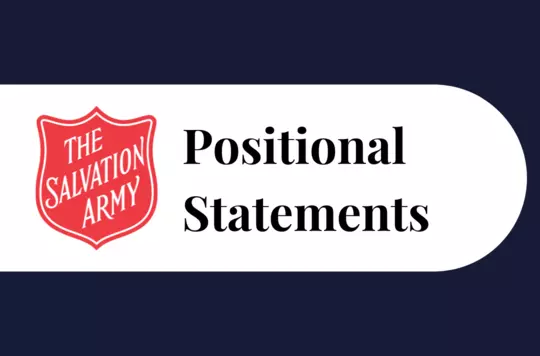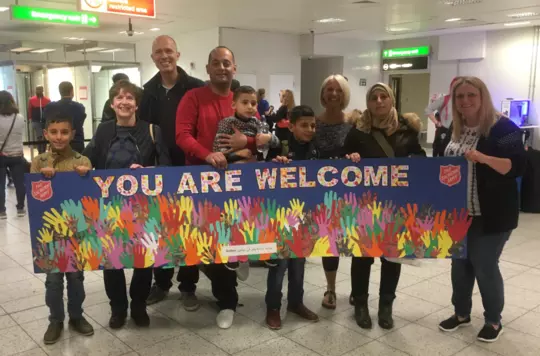14 August 2023
Navigating foreign lands
Captain Wan Gi Lee
Captain Wan Gi Lee reflects on what life is like for those who are displaced and disorientated.
Key text
Think of a time when you were in a foreign land, whether it was for work, business or a holiday. When surrounded by a whole new environment, how did you feel? You might have enjoyed an exciting experience as you encountered ‘the unexpected’ – strolling the unknown streets and exploring different cultures, peoples, or foods. I’m sure it would be a pleasant memory.
Imagine you were forced to be in a foreign land as an uninvited visitor, not just for a couple of weeks or months, but rather for several decades and beyond. This would put you in an altogether different position. You would have to leave the familiar behind – your home, language, culture, family and friends – and embrace the new, which would often be hostile to you. You would find yourself a foreigner in a strange land.
The Israelites were ‘foreigners’, ever since God called Abraham from Ur of the Chaldeans to Canaan: ‘Go from your country, your people and your father’s household to the land I will show you’ (Genesis 12:1).
The Bible records many stories of God’s people leaving their lands – from Joseph to David and Daniel to Paul. The whole Exodus story, followed by 40 years of the Israelites wandering in the wilderness, also testifies to this. Many left their homes in obedience to God’s plan. Jesus himself left the heavenly realm to come to Earth as God incarnate.
Psalm 146 is one of five psalms known as the ‘Hallelujah Psalms’. They all begin with the words ‘praise the Lord’ – ‘hallelujah’ in Hebrew.
After all sorts of outpouring of emotions, petitions, requests and prayers, these psalms get calmer as they focus on what God has done for the psalmists all through their sufferings. Often, such sufferings were deeply embedded in their ‘foreignness’ during times of exile and oppression by powerful nations such as Egypt, Assyria and Persia.
Pause and reflect
- At the beginning of the study, you reflected on your own ‘foreign’ experience. Can you relate such experience to this ‘foreignness’ of God’s people?
This might be difficult even for those who live as immigrants, but some may identify in a powerful way as the psalmist goes through detailed aspects of such ‘foreignness’. They might relate to the list of people in verses 7 to 9: the oppressed, the hungry, the prisoners, the blind, those who are bowed down, the foreigner, the fatherless and the widow.
Throughout their displacements and exiles, the people of Israel identify themselves with all sorts of people and, eventually, as the foreigners. God, however, upheld their cause, feeding them, healing them, setting them free, and watching over them all the way through their travels in unknown lands.
‘Praise the Lord, my soul. I will praise the Lord all my life; I will sing praise to my God as long as I live’ (vv1 and 2). The psalmist’s praise is so powerful because it is rooted in the real experiences of God’s people, both individually and collectively, all through their times of exile and journeying as vulnerable ‘foreigners’.
Humankind fails them. ‘Princes’ – the powerful and the influential – can’t protect them. The psalmist urges: ‘Do not put your trust in princes, in human beings, who cannot save’ (v3). Trust only God because, unlike humans with their limitations and often wrong motivations, our God ‘remains faithful for ever’ (v6).
Pause and reflect
- Is our praise to God substantial and powerful enough?
- If our praise is only limited to liturgical expression of doxology in Sunday worship, we won’t get anywhere near the depth and joy of the psalmist’s praise to the Lord.
William Booth famously declared that the word ‘foreigner’ should not be used in the Army, which is correct in terms of our identity as equal citizens of Heaven on Earth. I firmly believe that without restoring a sense of ‘foreignness’, our walk with God and praise to him will be greatly weakened. We must detach ourselves from the inclination of trusting in ‘princes’ – the comfortable way of the world driven by money, power and the will to dominate.
Reading this psalm from the perspective of exiled people naturally draws our attention to many displaced people and communities around us today – people who are more likely to suffer injustice, poverty, natural disasters, trafficking and poor mental health. If we don’t rediscover them as our own and recognise God’s powerful protection on them, our hallelujah will be only lip service.
God’s mandate still stands today, just as it did for the Israelites. We must not forget his instruction: ‘You must not mistreat or oppress foreigners in any way. Remember, you yourselves were once foreigners in the land of Egypt’ (Exodus 22:21 New Living Translation).
Do we remember and practise this today or are we following the agenda of the ‘princes’ of this world?
To what extent are we used to ignoring ‘foreigners’ as invisible in the public sphere?
Paul reminds us: ‘Do not conform to the pattern of this world, but be transformed by the renewing of your mind’ (Romans 12:2).
As the psalmist and so many biblical figures experienced in exile, let us leave the familiar behind as foreigners in the world and together – with full trust in God – take the road ahead to embrace the new. In his book God in Public, Tom Wright comments: ‘Our task is not just to tell but to live out the story of God.’
Pause and reflect
- How does the word ‘foreigner’ come to you?
- Where do you identify yourself in this psalm?
- What hinders you in opening yourself to others?
- How does your fellowship welcome and embrace displaced people in seeking God’s plan and protection for them?
Bible study by

Captain Wan Gi Lee
Corps Officer, St Albans
Discover more

The Salvation Army's International Positional Statement on Refugees and Asylum Seekers.

Supporting and resourcing local expressions of The Salvation Army to help people seeking sanctuary.


